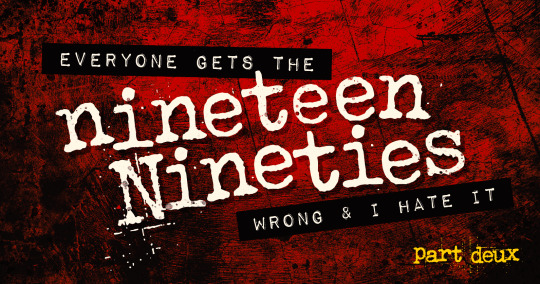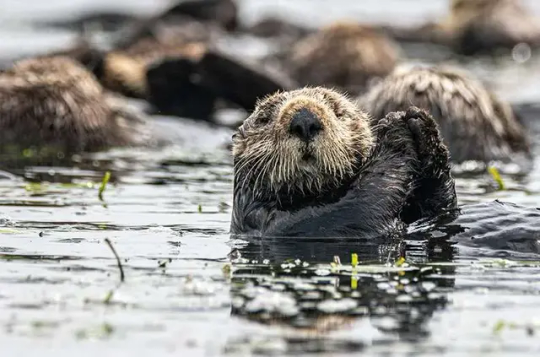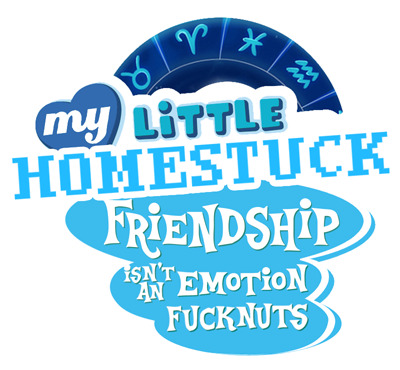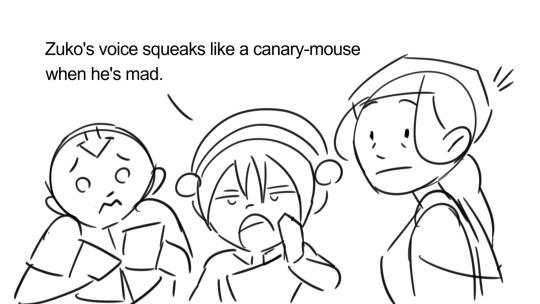Text
reblog this and tell me in the notes which book you've reread most in your life, pretty please!
55 notes
·
View notes
Text
NDHSNHDBDHE

4K notes
·
View notes
Text
you cant fucking hurt me bitch im protected by the migratory bird act
107K notes
·
View notes
Text
Everyone gets “The 90s” look wrong so let’s fix it

If you weren’t here for part one, lemme sum it up real fast:


Okay, all up to speed? We’re being served 80s throwback stuff with the serial numbers scratched off, re-labeled as yo totally 90s. What we’ve got now isn’t completely wrong, but I’m telling you, there’s so much gold left unmined.

As we saw in part one with Memphis Milano, these things get messy. Trends don’t start and end neatly every ten years. The first wave of 90s throwback attempts focused on the early part of the decade, and nobody since really pushed to represent the other seven years. Well, if you really wanna do something, I guess you gotta do it yourself.
I have suggestions. Get your flannel ready, we’ve got a lot of ground to cover.
Keep reading
47K notes
·
View notes
Text
When people get a little too gung-ho about-
wait. cancel post. gung-ho cannot be English. where did that phrase come from? China?
ok, yes. gōnghé, which is…an abbreviation for “industrial cooperative”? Like it was just a term for a worker-run organization? A specific U.S. marine stationed in China interpreted it as a motivational slogan about teamwork, and as a commander he got his whole battalion using it, and other U.S. marines found those guys so exhausting that it migrated into English slang with the meaning “overly enthusiastic”.
That’s…wild. What was I talking about?
11K notes
·
View notes
Text
Working at the sex shop really did rewire my brain. There was basically no topic that was too taboo to talk about, and what little propriety I’d had evaporated. I’d be out walking and chatting with friends about erotica I’d had to read that day only to be shushed and realize people were staring at me.
It always struck me as a little bit silly but I learned to curb myself for others comfort levels. Mostly.
But I have one distinct memory of decorating holiday cookies with my parents and my grandmother. My mom had worked in a sex shop back in her day, and I never hid my line of work from my family, so I was telling a work story.
I was conscious that my dad was slightly more sensitive, so I was using pretty broad descriptions, but I happened to mention silicone lube (I was telling my horror story) and my nana asked, “What’s that?”
I went into full sales mode. Focused on the little reindeer cookie I was decorating I started info dumping, “Oh, it’s pretty great. Water based lubricants get absorbed through vaginal mucous membranes, but silicone is too dense and our body can’t absorb it the same way. So once you apply some silicone you never have to worry about chafing, and a little goes a long way. It’s especially popular with older women, because they start producing less natural lubricant and absorb water based lubes so quickly.”
There was a silent beat after this statement.
I looked up.
My mom and grandmother were looking at me with rapt attention, and I belatedly realized I was addressing two older women who probably would welcome extra lubrication.
And then there was my dad, blushing so pink with embarrassment that I thought he was about to faint.
“I can talk about something else,” I offered in apology to my dad.
“Like hell! He can go in the other room, tell me more!” My nana declared. My dad scampered off to busy himself in another room while I answered their questions and talked about brands and pricing.
I slipped them each a small bottle of silicone lube for the holidays.
12K notes
·
View notes
Text
First thing you see after you zoom in is how you die

How you dying 👀
216K notes
·
View notes
Text
"Many people know about the Yellowstone wolf miracle. After wolves were reintroduced to the national park in the mid-1990s, streamside bushes that had been grazed to stubble by out-of-control elk populations started bouncing back. Streambank erosion decreased. Creatures such as songbirds that favor greenery along creeks returned. Nearby aspens flourished.
While there is debate about how much of this stemmed from the wolves shrinking the elk population and how much was a subtle shift in elk behavior, the overall change was dramatic. People were captivated by the idea that a single charismatic predator’s return could ripple through an entire ecosystem. The result was trumpeted in publications such as National Geographic.
But have you heard about the sea otters and the salt marshes? Probably not.
It turns out these sleek coastal mammals, hunted nearly to extinction for their plush pelts, can play a wolf-like role in rapidly disappearing salt marshes, according to new research. The findings highlight the transformative power of a top predator, and the potential ecosystem benefits from their return.
“It begs the question: In how many other ecosystems worldwide could the reintroduction of a former top predator yield similar benefits?” said Brian Silliman, a Duke University ecologist involved in the research.
The work focused on Elk Slough, a tidal estuary at the edge of California’s Monterey Bay. The salt marsh lining the slough’s banks has been shrinking for decades. Between 1956 and 2003, the area lost 50% of its salt marshes.
Such tidal marshes are critical to keeping shorelines from eroding into the sea, and they are in decline around the world. The damage is often blamed on a combination of human’s altering coastal water flows, rising seas and nutrient pollution that weakens the roots of marsh plants.
But in Elk Slough, a return of sea otters hinted that their earlier disappearance might have been a factor as well. As many as 300,000 sea otters once swam in the coastal waters of western North America, from Baja California north to the Aleutian Islands. But a fur trade begun by Europeans in the 1700s nearly wiped out the animals, reducing their numbers to just a few thousand by the early 1900s. Southern sea otters, which lived on the California coast, were thought to be extinct until a handful were found in the early 1900s.
In the late 1900s, conservation organizations and government agencies embarked on an effort to revive the southern sea otters, which remain protected under the Endangered Species Act. In Monterey Bay, the Monterey Bay Aquarium selected Elk Slough as a prime place to release orphaned young sea otters taken in by the aquarium.
As the otter numbers grew, the dynamics within the salt marsh changed. Between 2008 and 2018, erosion of tidal creeks in the estuary fell by around 70% as otter numbers recovered from just 11 animals to nearly 120 following a population crash tied to an intense El Niño climate cycle.
While suggestive, those results are hardly bulletproof evidence of a link between otters and erosion. Nor does it explain how that might work.
To get a more detailed picture, the researchers visited 5 small tidal creeks feeding into the main slough. At each one, they enclosed some of the marsh with fencing to keep out otters, while other spots were left open. Over three years, they monitored the diverging fates of the different patches.
The results showed that otter presence made a dramatic difference in the condition of the marsh. They also helped illuminate why this was happening. It comes down to the otters’ appetite for small burrowing crabs that live in the marsh.

Adult otters need to eat around 25% of their body weight every day to endure the cold Pacific Ocean waters, the equivalent of 20 to 25 pounds. And crabs are one of their favorite meals. After three years, crab densities were 68% higher in fenced areas beyond the reach of otters. The number of crab burrows was also higher. At the same time, marsh grasses inside the fences fared worse, with 48% less mass of leaves and stems and 15% less root mass, a critical feature for capturing sediment that could otherwise wash away, the scientists reported in late January in Nature.
The results point to the crabs as a culprit in the decline of the marshes, as they excavate their holes and feed on the plant roots. It also shows the returning otters’ potential as a marsh savior, even in the face of rising sea levels and continued pollution. In tidal creeks with high numbers of otters, creek erosion was just 5 centimeters per year, 69% lower than in creeks with fewer otters and a far cry from earlier erosion of as much as 30 centimeters per year.
“The return of the sea otters didn’t reverse the losses, but it did slow them to a point that these systems could restabilize despite all the other pressures they are subject to,” said Brent Hughes, a biology professor at Sonoma State University and former postdoctoral researcher in Silliman’s Duke lab.
The findings raise the question of whether other coastal ecosystems might benefit from a return of top predators. The scientists note that a number of these places were once filled with such toothy creatures as bears, crocodiles, sharks, wolves, lions and dolphins. Sea otters are still largely absent along much of the West Coast.
As people wrestle to hold back the seas and revive their ailing coasts, a predator revival could offer relatively cheap and effective assistance. “It would cost millions of dollars for humans to rebuild these creek banks and restore these marshes,” Silliman said of Elk Slough. “The sea otters are stabilizing them for free in exchange for an all-you-can-eat crab feast.”"
-via Anthropocene Magazine, February 7, 2024
3K notes
·
View notes
Text
26K notes
·
View notes
Text
youy momma so MARIO she jumps for joy when she gets the gold coin!
30K notes
·
View notes
Text
What do you guys know about decolonization and indigenous rights?
4 notes
·
View notes









